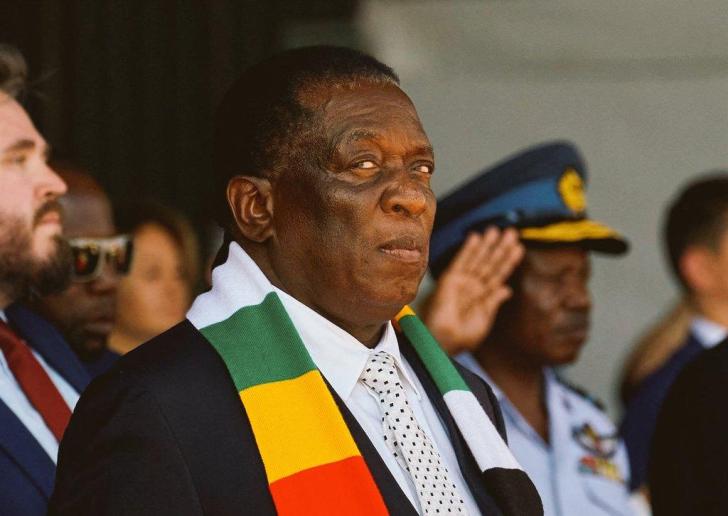News / National
Slap in the face for ED2030 brigade
28 Oct 2024 at 07:08hrs |
0 Views

In a dramatic turn of events at Zanu-PF's annual people's conference held in Bulawayo, party loyalists fervently pushed for a resolution to amend the Constitution, allowing President Emmerson Mnangagwa to extend his tenure beyond the two terms mandated, which currently end in 2028. However, the anticipated support for this move faced a significant setback when Mnangagwa himself firmly stated he would not seek an extension.
The resolution was a focal point of the conference, with fervent backing from various party factions, including the Women's League and a segment of the Youth League, particularly from the Midlands and Masvingo provinces. These supporters rallied around the ED2030 campaign, arguing that extending Mnangagwa's presidency would enable him to complete his vision for the country.
Despite this fervent push, Zanu-PF's legal secretary, Patrick Chinamasa, disclosed that Mnangagwa had expressed his intention to leave office in 2028 during three separate meetings over the past few months. Chinamasa emphasized that Mnangagwa's position remained unchanged, despite the loud calls for a constitutional amendment.
The atmosphere at the conference was charged, with Mnangagwa's resistance to extending his tenure disappointing many of his ardent supporters. His repeated insistence on adhering to the constitutional term limits served as a stern reminder to party members of the importance of maintaining political integrity and discipline within Zanu-PF.
In his closing remarks, Mnangagwa highlighted the need for a unified leadership and a commitment to the party's constitution. He urged party cadres to respect the established rules and warned against straying from the correct path, which he said could lead to "fatal mistakes" and dire consequences for both the liberation movement and the people's revolution.
The push for a tenure extension, according to Mnangagwa, seemed to be motivated not by genuine support for his leadership but rather by self-interest among certain loyalists who sought to preserve their power and influence within the party. This revelation has led to calls for reflection among party members, with suggestions that those perpetuating such ideas should be held accountable.
The discussion around constitutional amendments has raised concerns about the implications of sycophancy within the ruling party, as critics argue that a culture of blind loyalty can undermine sound governance and economic stability. The economy is currently grappling with significant challenges, including a struggling currency and ongoing financial instability, making the need for rational, issue-based politics more pressing than ever.
By standing firm against the proposed extension, Mnangagwa has not only upheld his commitment to the Constitution but has also potentially salvaged his reputation amidst growing political tensions. In a political landscape often clouded by sycophantic tendencies, his decision serves as a reminder that effective leadership requires an unwavering adherence to democratic principles and accountability. As he prepares to exit the stage in 2028, Mnangagwa's refusal to succumb to pressure highlights the importance of foresight in leadership, akin to knowing when to gracefully conclude a performance.
The resolution was a focal point of the conference, with fervent backing from various party factions, including the Women's League and a segment of the Youth League, particularly from the Midlands and Masvingo provinces. These supporters rallied around the ED2030 campaign, arguing that extending Mnangagwa's presidency would enable him to complete his vision for the country.
Despite this fervent push, Zanu-PF's legal secretary, Patrick Chinamasa, disclosed that Mnangagwa had expressed his intention to leave office in 2028 during three separate meetings over the past few months. Chinamasa emphasized that Mnangagwa's position remained unchanged, despite the loud calls for a constitutional amendment.
The atmosphere at the conference was charged, with Mnangagwa's resistance to extending his tenure disappointing many of his ardent supporters. His repeated insistence on adhering to the constitutional term limits served as a stern reminder to party members of the importance of maintaining political integrity and discipline within Zanu-PF.
The push for a tenure extension, according to Mnangagwa, seemed to be motivated not by genuine support for his leadership but rather by self-interest among certain loyalists who sought to preserve their power and influence within the party. This revelation has led to calls for reflection among party members, with suggestions that those perpetuating such ideas should be held accountable.
The discussion around constitutional amendments has raised concerns about the implications of sycophancy within the ruling party, as critics argue that a culture of blind loyalty can undermine sound governance and economic stability. The economy is currently grappling with significant challenges, including a struggling currency and ongoing financial instability, making the need for rational, issue-based politics more pressing than ever.
By standing firm against the proposed extension, Mnangagwa has not only upheld his commitment to the Constitution but has also potentially salvaged his reputation amidst growing political tensions. In a political landscape often clouded by sycophantic tendencies, his decision serves as a reminder that effective leadership requires an unwavering adherence to democratic principles and accountability. As he prepares to exit the stage in 2028, Mnangagwa's refusal to succumb to pressure highlights the importance of foresight in leadership, akin to knowing when to gracefully conclude a performance.
Source - newsday
Join the discussion
Loading comments…




























